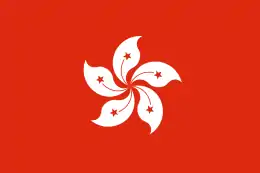Sport in Hong Kong
Sports in Hong Kong are a significant part of its culture. Due to British influence going as far back as the late 19th century, Hong Kong had an earlier introduction to Western athletics compared to other Asia regions. Horse racing has most spectators,[1] while basketball, football, swimming, badminton, table tennis, cycling and running have the most participants. Golf is an increasingly popular sport, despite the relatively few number of courses in the city. In 2009, Hong Kong successfully organised the V East Asian Games and it was the biggest sporting event ever held in the territory. Other major international sporting events including the Equestrian at the 2008 Summer Olympics, the Hong Kong Open Golf Championship, the Hong Kong Sevens, Hong Kong Marathon, AFC Asian Cup, EAFF East Asian Cup, Hong Kong Badminton Open, Hong Kong Tennis Classic, Premier League Asia Trophy, and Lunar New Year Cup. Hong Kong athletes have improved in worldwide rankings. As of 2010, there are 32 Hong Kong athletes from seven sports ranking in world's Top 20, 29 athletes in six sports in Asia top 10 ranking. Moreover, Hong Kong is equally impressive performance of athletes with disabilities in 2009, having won four world championships and two Asian Champions.[2]
| Demographics and culture of Hong Kong |
|---|
| Demographics |
| Culture |
| Other Hong Kong topics |
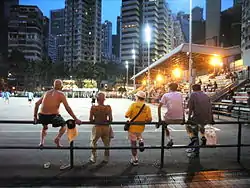
History
Hong Kong City Hall is located today where the original location of "Victoria Recreation Club" stood in 1849 after having been in operation in Canton since 1832. It is the first sporting club established in Hong Kong's history.[3] The first sports involved were water sports such as rowing.
The Hong Kong Open golf tournament is Hong Kong's oldest professional sporting event.
The primary sport in Hong Kong has been football due mainly to British influence going as far back as the late 19th century. The first documented team came from the "Chinese Football Team" of 1904, which began as a club called the "South China Athletic Club" founded by Mok Hing.[3] It was the first team to join The Hong Kong Football Association league in 1913/1914. At the time, the introduction of Hong Kong First Division League in 1908 was also another milestone. In the 1917 Far Eastern Games and 1919 Far Eastern Games, the club represented the Republic of China and won the football championship.[3] It is the only team in Hong Kong sports history to have accomplished this feat.[3] Around 1920–1922, it formally adopted the present name of South China Athletic Association and diversified into other sports.[3]
Financial Secretary John James Cowperthwaite was one of the first government official to assist Hong Kong going into the 1956 Summer Olympics in Melbourne Australia with a contribution estimate of HK$10,000.[3]
Victoria Park was one of the free range open space for pick-up games. Until the Hong Kong Stadium was built, there was no arena for spectator sports. By the 1960s a number of clubs have surfaced for mostly social reasons. Since then, Hong Kong sports has been described as "Club Life". Some clubs have documented their history thoroughly, while others have disappeared along with their past.
|
|
|
A large sports park is currently being constructed on the site of the old Kai Tak Airport. Once completed, Kai Tak Sports Park will be the largest sports venue in Hong Kong and will include a 50,000 seat Main Stadium, an Indoor Sports Center, a Public Sports Ground and multiple open spaces.[4]
Transition
After World War II the Amateur Sports Federation & Olympic Committee of Hong Kong (ASF&OC) was established. The committee selected athletic leaders to represent Hong Kong in times of competition. Eventually the committee became known as the National Olympic Committee. After the transfer of sovereignty in 1997, Hong Kong has competed internationally under the name "Hong Kong, China" with the Bauhinia region flag. It is treated separately from People's Republic of China, which is counted as another entry in the games.
Participant sports
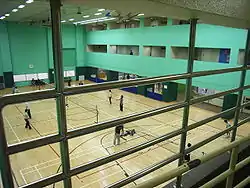
A variety of sports are available in Hong Kong, with most having their own association, and many clubs and groups, along with provision by bodies such as YWCA and YMCA. There are also local organisations that strive to help Hong Kong residents identify sports that are not broadly advertised enough.[5][6] The Hong Kong Government is also known for its proactive approach towards sporting events prior to the Beijing Olympics.
There are many sports available in Hong Kong for participation by residents, including:
Spectator sports
Basketball
Basketball is Hong Kong's most popular sport.[7]
Hong Kong's national basketball team regularly qualifies for the FIBA Asia Championship. In club competitions, its team Regal won the 1997 ABC Champions Cup.
Hong Kong hosted the official 1983 Asian Basketball Championship.
Golf
Golf has been played in Hong Kong ever since the establishment of the Hong Kong Golf Club in 1879. The club, which has hosted the Hong Kong Open every year since 1959, has two sites - Fanling, which is home to three championship-calibre courses, and Deep Water Bay, a short nine hole course in southern Hong Kong Island. Hong Kong Golf Club is considered among the premier golf clubs in Asia and, despite being a private members' club, is open to visitors from Mondays through Fridays.
Horse racing
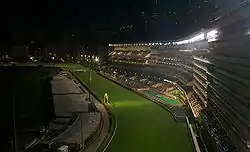
Horse racing is by far the most popular spectator sport in Hong Kong and generates the largest horse race gambling turnover in the world.[1] This British tradition left its mark as one of the most important entertainment and gambling institutions in Hong Kong. Established as the Royal Hong Kong Jockey Club in 1884, the non-profit organization conducts nearly 700 races every season at the two race tracks in Happy Valley and Sha Tin. The sport annually draws in over 11% of Hong Kong's tax revenue. Off-track betting is available from overseas bookmakers. In 2009, betting on horse races generated an average US$12.7 million in gambling turnover per race, 6 times larger than its closest rival France at US$2 million while the United States only generated $250,000. Some consider betting on horse races an investment.[8]
Football
Lunar New Year Cup which held in Hong Kong Stadium is famous international football tournament in which is hosted in Hong Kong.
Cricket
Cricket in Hong Kong has been played since at least 1841. Like most cricketing nations, it was part of the British Empire. The national cricket team has been active since 1866, and the Hong Kong Cricket Association was granted associate membership of the International Cricket Council (ICC) in 1969. Hong Kong hosted the Hong Kong Cricket Sixes, an ICC sanctioned event that features teams of six players in a six over competition annually till 2012. The Hong Kong Cricket Team qualified for 2014 ICC World Twenty20 and caused a major upset by defeating hosts Bangladesh.
Dragon boat racing
The traditional Chinese sport of dragon boat racing was originally held as part of the Duan Wu festivities in Hong Kong. It is now spread internationally with races held all around the world. The Hong Kong Dragon Boat Association was a founding member of the international and regional governing bodies for dragon boat racing: The International Dragon Boat Federation and Asian Dragon Boat Federation. The oldest International Festival Races are those held in Hong Kong annually. The HKIR have been held since 1976 and are acknowledged as starting the modern era of the dragon boatsport.
Rugby union
Rugby is long established, partly as a result of its being a British colony. In contrast to the People's Republic of China, it has had a continuous existence dating back over a hundred years, and is most notable for its sevens tournaments.
The Hong Kong Rugby Football Union was founded in 1953.
Formula E
The Hong Kong ePrix is an annual race of the single-seater, electrically powered Formula E championship, held at the Hong Kong Central Harbourfront Circuit in Hong Kong. It was first raced in the 2016–17 season.
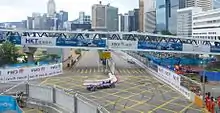
Lacrosse
Hong Kong men's national lacrosse team is one of Asia's top teams. It has qualified for the World Lacrosse Championship for the fifth consecutive time.
Organisations
Hong Kong Games
Hong Kong Marathon
The Hong Kong Marathon takes place every February and draws as many as 30,000 participants.
International sporting events
Hong Kong competes separately from China in various international sporting events. Hong Kong also had its own team during British administration prior to 1997.
Asian Games
Hong Kong has been participating in the Asian Games since the 1954 Games. The most recent participation was the 2018 Asian Games.
East Asian Games
Hong Kong has participated in every East Asian Games since 1993, being a member of the East Asian Games Association (EAGA). The territory hosted the 2009 East Asian Games.
Commonwealth Games
Hong Kong competed at the Commonwealth Games from 1934 until 1994 as a British colony (as a Dependent territory since the 1986 Games). Over the years Team Hong Kong picked up a number of medals, including in Lawn Bowls.
Summer Olympics
Hong Kong has participated in all Summer Olympic Games since the 1952 Games in Helsinki, Finland. The first medal was won in the 1996 Games in Atlanta, US. Lee Lai Shan won gold in the women's mistral individual event in sailing. Coincidentally, it was also the last medal won by Hong Kong as a British territory.
The territory participated under the new name and its new regional flag for the first time in the 2000 Games in Sydney. Hong Kong won its second ever Olympic medal in the 2004 Games in Athens, Greece where Hong Kong won silver in men's doubles event in table tennis. In London 2012, Wai Sze Lee won Hong Kong's first ever Olympic medal in cycling and its third overall.
The equestrian events of the 2008 Summer Olympics was held in Hong Kong. This marked the second time the same edition of the Olympic Games being hosted by two National Olympic Committees, namely by that of the People's Republic of China and Hong Kong. The Hong Kong Sports Institute at Fo Tan, Sha Tin was the site of the events.
Winter Olympics
Hong Kong participated its first Winter Olympic Games in the 2002 Games in Salt Lake City, USA. Hong Kong has not won a medal at the Winter Games.
Hong Kong Sevens
The Hong Kong Sevens were established in 1976 and since held in March every year except for 1997 and 2005. It is considered the premier tournament on the IRB Sevens World Series. Organised by the Hong Kong Rugby Football Union, the tournament is held annually at the last weekend of March as a two-and-a-half-day event. It is participated by as many as 22 countries.
World Equestrian Games
Hong Kong participated in its first World Equestrian Games (WEG) in 2014 in Normandy France in Endurance, Show Jumping, and para-Dressage.
Gay Games
Hong Kong was announced as the host city of the 11th Gay Games, at a gala event at the Hotel de Ville in Paris, on 30 October 2017. They won with a clear majority of votes, in the first round of voting. It is the first time that the Gay Games will be held in Asia.
The "longlist" of cities interested in bidding to host Gay Games XI in 2022 was announced in April 2016.[9] An unprecedented seventeen cities were interested in bidding. On 30 June 2016, the Federation of Gay Games announced that eleven cities had submitted their Letter of Intent to formally bid.[10] Anaheim, Atlanta, Des Moines, Madison, Minneapolis and San Antonio decided not to pursue their option to bid. On 31 July 2016, 9 cities submitted their second registration fee to remain in the bid process. Both Cape Town and Tel Aviv dropped out at this stage, stating an intention to bid for Gay Games XII in 2026. On 30 November 2016, Bid Books were submitted by eight candidate cities with Los Angeles dropping out at this stage.
References
- Where to watch sports in Hong Kong Archived 25 April 2016 at the Wayback Machine, Rory Boland (GoHongKong.about.com). 29 November 2015, Retrieved 19 January 2016.
- "Legislative Council Panel on Home Affairs Sports Development Policy and Objectives" (PDF). Home Affairs Bureau. October 2010. Archived (PDF) from the original on 4 December 2013. Retrieved 8 June 2013.
- Lam, S. F. Chang W, Julian. [2006] (2006) The Quest for Gold: Fifty Years of Amateur Sports in Hong Kong, 1947–1997. Hong Kong University Publishing. ISBN 962-209-766-9.
- "Government awards contract for Kai Tak Sports Park (with photos)". www.info.gov.hk. Retrieved 18 August 2020.
- "Welcome! | Hong Kong Activities". Archived from the original on 25 May 2019. Retrieved 26 December 2019.
- Sports to do in Hong Kong Archived 30 May 2009 at the Wayback Machine
- Most popular sports in Hong Kong mostpopularsports.net. Accessed 9 February 2021.
- "Hong Kong's hardcore gamblers". CNNMoney. Archived from the original on 8 March 2018. Retrieved 7 March 2018.
- https://www.facebook.com/notes/gay-games/federation-of-gay-games-announces-prospective-2022-gay-games-xi-bid-cities/1233582700003975%5B%5D
- https://www.facebook.com/notes/gay-games/federation-of-gay-games-announces-cities-continuing-2022-gay-games-xi-bid-proces/1285749498120628%5B%5D
